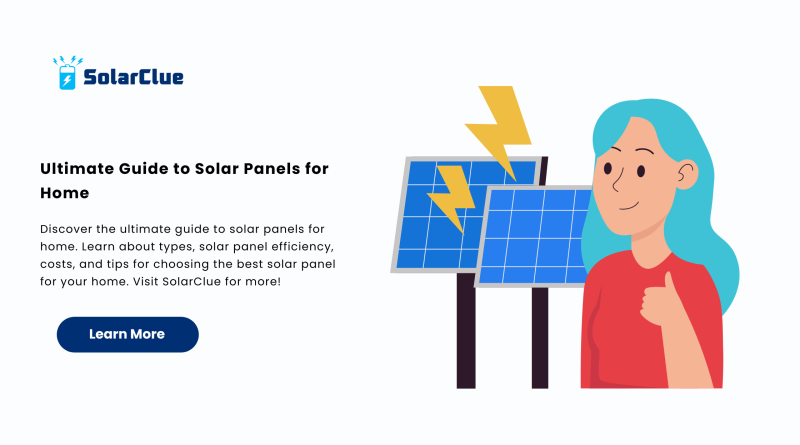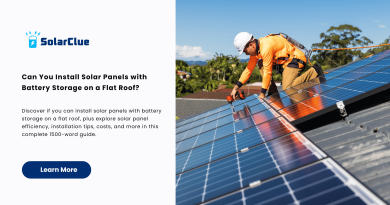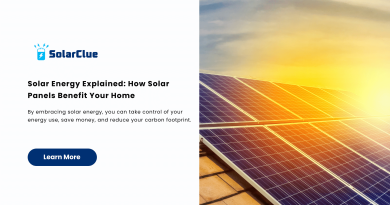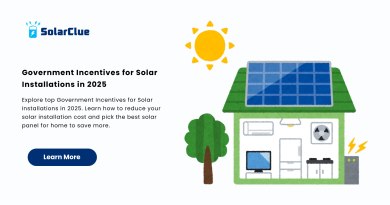Ultimate Guide to Solar Panels for Home
Ultimate Guide to Solar Panels for Home: As climate change becomes a more pressing issue, homeowners are increasingly looking for ways to reduce their carbon footprint and save money. Installing solar panels for home has become one of the most popular solutions. Not only do solar panels offer a clean source of renewable energy, but they also significantly cut electricity costs over time. Thanks to modern technology and financial incentives, switching to solar is easier and more affordable than ever before.
Table of Contents
- 1 What Are Solar Panels and How Do They Work?
- 2 Benefits of Installing Solar Panels for Home
- 3 Understanding Solar Panel Efficiency
- 4 Choosing the Best Solar Panels for Your Home
- 5 Cost Breakdown: How Much Do Solar Panels Cost?
- 6 Best Solar Panel Types for Homeowners
- 7 How to Find the Best Solar Panels for Your Home
- 8 Common Myths About Solar Panels Debunked
- 9 Solar Panel Maintenance Tips for Maximum Longevity
- 10 Future Trends in Solar Technology
- 11 Conclusion: Is Solar Power Right for Your Home?
- 12 FAQs
What Are Solar Panels and How Do They Work?
Basics of Solar Power
Solar panels are devices designed to capture sunlight and convert it into electricity using photovoltaic cells. When sunlight strikes these cells, it triggers the flow of electricity which can power your home’s appliances and lighting. Whether you’re considering a single solar panel for home use or a full rooftop installation, understanding the basic working mechanism can help you appreciate the technology behind your investment.
Key Components of a Solar Panel System
A standard solar setup includes several crucial parts: the solar panel itself, an inverter that converts DC to AC electricity, a mounting structure, and sometimes battery storage for saving excess power. Each component plays a vital role in ensuring your system operates at peak performance and maximizes your solar panel efficiency.
Benefits of Installing Solar Panels for Home
Energy Savings and Financial Incentives
Installing solar panels for home dramatically reduces your reliance on grid electricity, resulting in substantial savings on monthly bills. Moreover, government rebates, tax credits, and incentives further lower the cost of switching to solar. Over time, homeowners recover their initial investment and continue saving for decades.
Environmental Impact and Sustainability
Using solar panels helps reduce your home’s carbon emissions, contributing to a healthier planet. Unlike fossil fuels, solar energy is abundant and renewable, making it a key part of sustainable living initiatives around the globe.
Understanding Solar Panel Efficiency
Factors Affecting Solar Panel Performance
Solar panel efficiency measures how much sunlight a panel can convert into usable electricity. Factors such as material quality, placement, angle, temperature, and shading can all influence the overall output. Higher efficiency means more power from a smaller space, which is especially beneficial for homes with limited roof areas.
How to Maximize Efficiency at Home
To get the most from your solar panels, place them in an area that gets maximum sunlight throughout the day. Regular maintenance, like cleaning the panels and inspecting for damage, ensures optimal performance. Investing in high-quality products from trusted sources like SolarClue.com can also make a big difference.
Choosing the Best Solar Panels for Your Home
Key Features to Look For
When shopping for the best solar panel, look at efficiency ratings, warranty periods, durability against weather conditions, and brand reputation. The best solar panels for your home should strike a balance between affordability and performance.
Top Brands and Models in 2025
Leading brands like SunPower, LG, and Panasonic are known for their high-efficiency panels. New players in the market are also offering competitive options, making it essential to compare specifications and customer reviews before making a choice.
Cost Breakdown: How Much Do Solar Panels Cost?
Installation Costs and Hidden Fees
The average cost of installing solar panels for home varies depending on location, size, and type of system. On average, it ranges between $10,000 to $25,000 before incentives. Make sure to account for hidden fees like permits, inspection costs, and optional battery systems.
Return on Investment (ROI) Expectations
Despite the upfront cost, the ROI for solar panels is attractive. Homeowners typically break even within 5-7 years and enjoy free electricity for 20 years or more. Plus, adding solar panels can increase property value significantly.
Best Solar Panel Types for Homeowners
Monocrystalline vs. Polycrystalline vs. Thin-Film
Monocrystalline panels are known for their superior solar panel efficiency and sleek appearance but tend to be more expensive. Polycrystalline panels are cheaper but slightly less efficient. Thin-film panels are lightweight and flexible, ideal for unconventional installations but typically less efficient.
Which One Fits Your Needs?
Choosing the right type depends on your budget, roof size, and energy needs. If you want maximum efficiency and don’t mind paying a premium, monocrystalline is often the best choice. For budget-conscious homeowners, polycrystalline offers a balanced option.
How to Find the Best Solar Panels for Your Home
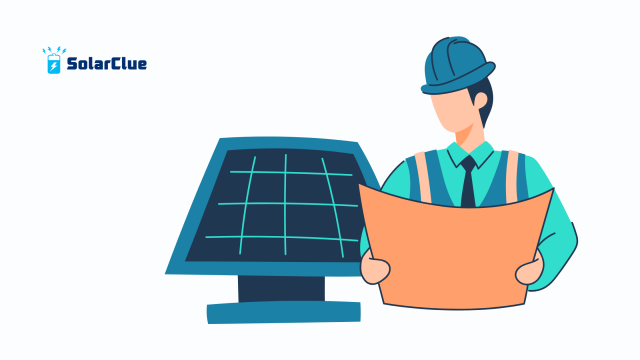
Comparing Options and Reading Reviews
Before purchasing solar panels, it’s crucial to compare different models, read verified customer reviews, and consult expert opinions. Platforms like blog.solarclue.com offer detailed comparisons and helpful buyer guides to make your decision easier.
SolarClue.com: Your Trusted Solar Marketplace
If you want a hassle-free experience, check out SolarClue.com, which features a wide variety of best solar panels for your home, with transparent pricing and trusted warranties.
Common Myths About Solar Panels Debunked
Solar Panels Work Only in Sunny Areas
While solar panels perform best under full sunlight, they still generate electricity on cloudy days, albeit at reduced efficiency. Countries with less sunshine, like Germany, have successfully adopted solar energy on a massive scale.
Solar Panels Are Too Expensive
Thanks to tax credits, government programs, and declining technology costs, solar panel installation is more affordable than ever. Many financing options and lease programs make it accessible to nearly every homeowner.
Solar Panel Maintenance Tips for Maximum Longevity
Cleaning and Inspection Guide
Routine cleaning to remove dust, debris, and bird droppings can significantly improve solar panel efficiency. Visual inspections for cracks or shading issues should be performed every few months.
When to Call for Professional Help
If you notice a significant drop in energy production, it’s best to contact a professional for a detailed inspection. Regular maintenance extends the lifespan of your solar panels for home investment.
Future Trends in Solar Technology
Smart Solar Panels and AI Integration
Emerging technologies like AI-integrated smart solar panels offer real-time performance tracking and automated adjustments for maximum output.
Solar Batteries and Energy Storage Solutions
Solar batteries are becoming more affordable and efficient, allowing homeowners to store excess energy and use it during nighttime or outages, enhancing the overall system performance.
Conclusion: Is Solar Power Right for Your Home?
Switching to solar panels for home is a smart move both financially and environmentally. With significant cost savings, increasing property value, and a positive impact on the planet, there’s no better time to invest. Remember to research thoroughly, choose the best solar panel that fits your needs, and take advantage of expert resources like SolarClue.com and blog.solarclue.com to make your journey to solar simple and rewarding.
FAQs
1. How long do solar panels last?
Most solar panels come with a warranty of 25-30 years, and many continue to function efficiently beyond that time.
2. How much can I save annually with solar panels?
On average, homeowners save between $600 and $1,500 per year depending on system size and local electricity rates.
3. Do solar panels require a lot of maintenance?
No, solar panels require minimal maintenance—mostly occasional cleaning and annual inspections.
4. What is the most efficient solar panel?
Currently, monocrystalline solar panels are considered the most efficient, with some models exceeding 22% efficiency rates.
5. Can I install solar panels myself?
While DIY kits are available, professional installation is recommended to ensure maximum safety and solar panel efficiency.
If you’re ready to transform your home and cut your energy bills, don’t wait — explore the best options at SolarClue.com and stay updated with helpful tips at blog.solarclue.com. Let’s brighten your future together with solar power!

